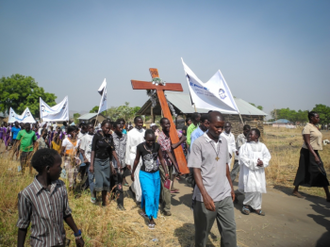South Sudan: Dangerous rise in hate speech is fuelling three year conflict

Thursday 15th December will mark the third anniversary since South Sudan descended into conflict. Not only does this mean that the world's newest nation has been at peace for less than half of its existence, the violence is getting worse.
"2016 has seen an escalation in conflict, displacement and loss of lives," said Francis Flood, country representative in South Sudan for the Catholic aid agency, CAFOD. He called on all the warring parties to bring a halt to the violence and resume negotiations.
A nation which achieved independence only five and a half years ago, in July 2011, has been riven by fighting between forces loyal to President Salva Kiir and followers of the former Vice President, Dr Riek Machar. Thousands have died and close to three million people have been displaced.
In July 2016, a brief peace deal between the two leaders collapsed, bringing three days of bloodshed in the capital, Juba. Atrocities were committed against women and children, and peacekeepers and humanitarian workers were attacked. The violence spread across the country.
For the first time, places like Yei, south west of the capital Juba, were engulfed in the conflict. Until a few months ago, the southern town was considered one of the safest places in South Sudan. Now more than half the 300,000 population has fled, amid reports of civilians being killed, mass rapes, and torture in detention. With the spread of fighting to the food-growing Equatoria region, the country faces the threat of starvation, with at least 4.6 million people estimated to be at risk.
The UN secretary-general's special adviser on preventing genocide, Adama Dieng, visited Juba in early November and warned that in the prevailing climate of violence and intolerance, there was "the potential for genocide" as a result of extreme polarisation between some tribal groups. The Secretary-General himself, Ban Ki Moon, condemned "the sharp rise in hate speech and ethnic incitement".
Bishop Eduardo Hiiboro Kussala of Tombura-Yambio diocese, a partner of CAFOD and Trocaire called for hate speech to stop. "For peace to prevail, we must all accept one another as brothers and sisters," he said. "Disparaging someone based on their tribe can only lead this country down a dangerous road. Let us come together and work as one to rebuild South Sudan."
As the humanitarian crisis deepens, CAFOD and Trócaire, working with local partners, have distributed maize flour, beans, cooking oil and salt to over 10,000 internally displaced people (IDPs) and vulnerable host families in the central area of Yirol East. Households most in need also received 2,000 kitchen utensils - pots and pans and hygiene kits.
"At present, CAFOD and Trócaire are one of the only agencies working in Yirol," said Francis Flood. "We call on the stakeholders, as a matter of urgency to liaise with the signatories of the August 2015 South Sudan peace agreement to call on their soldiers to stand down and the leaders to renew peace talks.
"May the excitement, vibrancy and promise of success that filled the hearts and minds of South Sudan in July 2011 inspire one and all to work together and unite South Sudan."


















